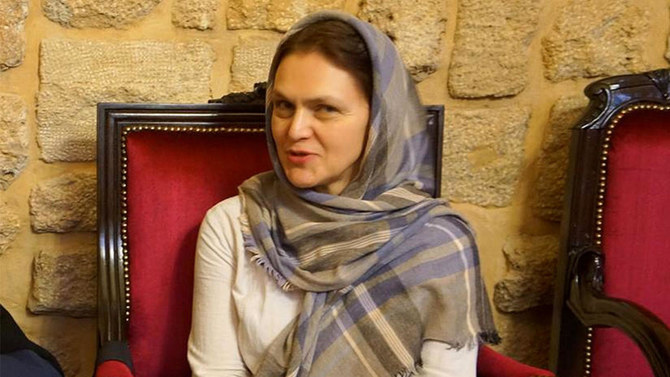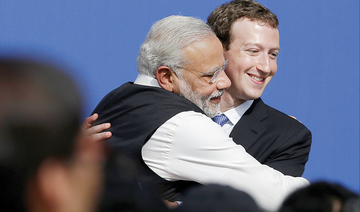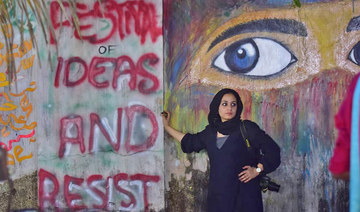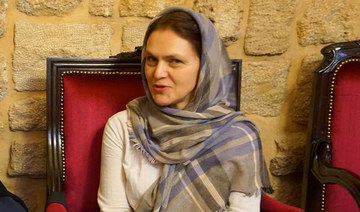NEW DELHI: Facebook in India has been selective in curbing hate speech, misinformation and inflammatory posts, particularly anti-Muslim content, according to leaked documents obtained by The Associated Press, even as the Internet giant’s own employees cast doubt over the its motivations and interests.
Based on research produced as recently as March of this year to company memos that date back to 2019, internal company documents on India highlight Facebook’s constant struggles in quashing abusive content on its platforms in the world’s biggest democracy and the company’s largest growth market. Communal and religious tensions in India have a history of boiling over on social media and stoking violence.
The files show that Facebook has been aware of the problems for years, raising questions over whether it has done enough to address the issues. Many critics and digital experts say it has failed to do so, especially in cases where members of Prime Minister Narendra Modi’s ruling Bharatiya Janata Party are involved.
Across the world, Facebook has become increasingly important in politics, and India is no different.
Modi has been credited for leveraging the platform to his party’s advantage during elections, and reporting from The Wall Street Journal last year cast doubt over whether Facebook was selectively enforcing its policies on hate speech to avoid blowback from the BJP. Modi and Facebook chairman and CEO Mark Zuckerberg have exuded bonhomie, memorialized by a 2015 image of the two hugging at the Facebook headquarters.
The leaked documents include a trove of internal company reports on hate speech and misinformation in India that in some cases appeared to have been intensified by its own “recommended” feature and algorithms. They also include the company staffers’ concerns over the mishandling of these issues and their discontent over the viral “malcontent” on the platform.
According to the documents, Facebook saw India as one of the most “at risk countries” in the world and identified both Hindi and Bengali languages as priorities for “automation on violating hostile speech.” Yet, Facebook didn’t have enough local language moderators or content-flagging in place to stop misinformation that at times led to real-world violence.
In a statement to the AP, Facebook said it has “invested significantly in technology to find hate speech in various languages, including Hindi and Bengali” which “reduced the amount of hate speech that people see by half” in 2021.
“Hate speech against marginalized groups, including Muslims, is on the rise globally. So we are improving enforcement and are committed to updating our policies as hate speech evolves online,” a company spokesperson said.
This AP story, along with others being published, is based on disclosures made to the Securities and Exchange Commission and provided to Congress in redacted form by former Facebook employee-turned-whistleblower Frances Haugen’s legal counsel. The redacted versions were obtained by a consortium of news organizations, including the AP.
Back in February 2019 and ahead of a general election when concerns of misinformation were running high, a Facebook employee wanted to understand what a new user in India saw on their news feed if all they did was follow pages and groups solely recommended by the platform itself.
The employee created a test user account and kept it live for three weeks, a period during which an extraordinary event shook India — a militant attack in disputed Kashmir had killed over 40 Indian soldiers, bringing the country close to war with rival Pakistan.
In the note, titled “An Indian Test User’s Descent into a Sea of Polarizing, Nationalistic Messages,” the employee whose name is redacted said they were “shocked” by the content flooding the news feed. The person described the content as having “become a near constant barrage of polarizing nationalist content, misinformation, and violence and gore.”
Seemingly benign and innocuous groups recommended by Facebook quickly morphed into something else altogether, where hate speech, unverified rumors and viral content ran rampant.
The recommended groups were inundated with fake news, anti-Pakistan rhetoric and Islamophobic content. Much of the content was extremely graphic.
One included a man holding the bloodied head of another man covered in a Pakistani flag, with an Indian flag partially covering it. Its “Popular Across Facebook” feature showed a slew of unverified content related to the retaliatory Indian strikes into Pakistan after the bombings, including an image of a napalm bomb from a video game clip debunked by one of Facebook’s fact-check partners.
“Following this test user’s News Feed, I’ve seen more images of dead people in the past three weeks than I’ve seen in my entire life total,” the researcher wrote.
The report sparked deep concerns over what such divisive content could lead to in the real world, where local news outlets at the time were reporting on Kashmiris being attacked in the fallout.
“Should we as a company have an extra responsibility for preventing integrity harms that result from recommended content?” the researcher asked in their conclusion.
The memo, circulated with other employees, did not answer that question. But it did expose how the platform’s own algorithms or default settings played a part in producing such objectionable content. The employee noted that there were clear “blind spots,” particularly in “local language content.” They said they hoped these findings would start conversations on how to avoid such “integrity harms,” especially for those who “differ significantly” from the typical US user.
Even though the research was conducted during three weeks that weren’t an average representation, they acknowledged that it did show how such “unmoderated” and problematic content “could totally take over” during “a major crisis event.”
The Facebook spokesperson said the test study “inspired deeper, more rigorous analysis” of its recommendation systems and “contributed to product changes to improve them.”
“Separately, our work on curbing hate speech continues and we have further strengthened our hate classifiers, to include four Indian languages,” the spokesperson said.
Facebook dithered in curbing divisive user content in India
https://arab.news/8bxzx
Facebook dithered in curbing divisive user content in India

- Communal and religious tensions in India have a history of boiling over on social media and stoking violence
- Facebook has become increasingly important in politics, and India is no different
Pulitzer Prizes in journalism awarded to The New York Times, The Washington Post, AP and others

- The Pulitzers honored the best in journalism from 2023 in 15 categories, as well as eight arts categories focused on books, music and theater
NEW YORK: The New York Times and The Washington Post were awarded three Pulitzer Prizes apiece on Monday for work in 2023 that dealt with everything from the war in Gaza to gun violence, and The Associated Press won in the feature photography category for coverage of global migration to the US.
Hamas’ Oct. 7 attack on Israel and its aftermath produced work that resulted in two Pulitzers and a special citation. The Times won for text coverage that the Pulitzer board described as “wide-ranging and revelatory,” while the Reuters news service won for its photography. The citation went to journalists and other writers covering the war in Gaza.

The prestigious public service award went to ProPublica for reporting that “pierced the thick wall of secrecy” around the US Supreme Court to show how billionaires gave expensive gifts to justices and paid for luxury travel. Reporters Joshua Kaplan, Justin Elliott, Brett Murphy, Alex Mierjeski and Kirsten Berg were honored for their work.
The Pulitzers honored the best in journalism from 2023 in 15 categories, as well as eight arts categories focused on books, music and theater. The public service winner receives a gold medal. All other winners receive $15,000.

The 15 photos in AP’s winning entry were taken across Latin America and along the US-Mexico border in Texas and California in a year when immigration was one of the world’s biggest stories. They were shot by AP staffers Greg Bull, Eric Gay, Fernando Llano, Marco Ugarte and Eduardo Verdugo, and longtime AP freelancers Christian Chavez, Felix Marquez and Ivan Valencia.
“These raw and emotional images came about through day-to-day coverage of a historic moment in multiple countries documenting migrants at every step of their treacherous journeys,” said Julie Pace, the AP’s senior vice president and executive editor.
The United States has seen more than 10 million border arrivals in the last five years, with migrants arriving from a wide range of new locations like Venezuela, Cuba, Ecuador, Haiti and Africa, in contrast with earlier eras.

The AP has won 59 Pulitzer Prizes, including 36 for photography. The news cooperative was named a finalist for the national reporting Pulitzer on Monday for its coverage of hundreds of thousands of children who disappeared from public schools during the pandemic.
In citing the Times for its work in Israel and Gaza, the Pulitzer board mentioned its coverage of the country’s intelligence failures, along with the attack and Israel’s military response.
The award comes even as The Times has faced some controversy about its coverage; last month a group of journalism professors called on the publication to address questions about an investigation into gender-based violence during the Hamas attack on Israel.
The Times’ Hannah Dreier won a Pulitzer in investigative reporting for her stories on migrant child labor across the United States. Contributing writer Katie Engelhart won the newspaper’s third Pulitzer, in feature writing, for her portrait of a family struggling with a matriarch’s dementia.
“Every one of the winners and finalists showcases a drive for original, revelatory reporting that underpins so much of what we produce, from the biggest storylines in the news to feature writing as well as classic investigations,” said Joe Kahn, the Times’ executive editor.
The Washington Post staff won in national reporting for its “sobering examination” of the AR-15 semi-automatic rifle, which came with some gut-wrenching photos. “We were eager to find a way to cover it differently and change the conversation about mass shootings,” Peter Walstein, the Post’s senior national enterprise editor, said in the newspaper.
The Post’s David E. Hoffman won in editorial writing for a “compelling and well-researched” series on how authoritarian regimes repress dissent in the digital age. Its third award went to contributor Vladimir Kara-Murza, for commentaries written from a Russian prison cell.
The New Yorker magazine won two Pulitzers. Sarah Stillman won in explanatory reporting for her report on the legal system’s reliance on felony murder charges. Contributor Medar de la Cruz won in illustrated reporting and commentary for his story humanizing inmates in the Rikers Island jail in New York City.
The staff of Lookout Santa Cruz in California won in the breaking news category for what the prize board called “nimble community-minded coverage” of flooding and mudslides. On its website Monday, Lookout Santa Cruz said that it made its coverage free at a time of crisis in the community, and also used text messages to reach people without power.
“In short, we did our jobs,” the staff said in an unsigned article, “and we heard so many thanks for it. The Pulitzer is icing on that cake.”
The Pulitzers gave a second award in national reporting to the Reuters staff for an “eye-opening” series that probed Elon Musk’s automobile and aerospace businesses.
In local reporting, Sarah Conway of City Bureau and Trina Reynolds-Tyler of the Invisible Institute won for an investigative series on missing Black girls and women in Chicago, which showed how racism and the police contributed to the problem.
The Pulitzer in criticism went to Justin Chang of The Los Angeles Times for evocative and genre-spanning coverage of movies. The Pulitzer board’s second special citation went to the late hip-hop critic Greg Tate.
The awards are administered by Columbia University in New York, which itself has been in the news for student demonstrations against the war in Gaza. The Pulitzer board met away from Columbia this past weekend to deliberate on its winners.
The Pulitzers announced that five of the 45 finalists this year used artificial intelligence in research and reporting of their submissions. It was the first time the board required applicants for the award to disclose use of AI.
The prizes were established in the will of newspaper publisher Joseph Pulitzer and first awarded in 1917.
Advocacy group ‘alarmed’ as journalists shot at in West Bank

- Al-Araby TV workers were not injured but their equipment was destroyed
- Ameed Shehade, Rabih Al-Monayar were wearing ‘Press’ vests at time of attack
LONDON: American advocacy group the Committee to Protect Journalists says it is “extremely concerned” after hearing reports that two Al-Araby TV journalists were shot at by Israeli forces in the West Bank on Saturday.
Reporter Ameed Shehade and camera operator Rabih Al-Monayar came under fire while they were covering an Israeli raid on the village of Deir al-Ghusun in Tulkarm.
Neither of the men was injured in the attack but their equipment was destroyed.
The CPJ urged Israel to launch an investigation into whether the journalists were deliberately targeted.
“CPJ is alarmed by the Israeli soldiers’ shooting at two Al-Araby TV journalists, which hit their camera, while they were reporting in the West Bank,” the group’s Program Director Carlos Martinez de la Serna said.
Although he was “relieved” that the journalists had not been injured, he said he questioned whether the targeting was intentional as it was the second case of reporters being attacked while doing their jobs.
Al-Araby TV aired footage of the two men, who were wearing blue vests labeled “Press,” taking cover near their car.
Shehade said the shots were fired from a vehicle about 20 meters (22 yards) away and that they were clearly visible to the soldier.
Another journalist who was reporting on the raids confirmed that Shehade and Al-Monayar could be easily identified as members of the press.
According to The Guardian, Israeli forces killed five Palestinians in the overnight raid. Hamas confirmed that four of the men killed were from its al-Qassam armed wing.
Al-Monayar and Shehade suffered a similar attack in July last year while reporting on an Israeli operation against militants in the Jenin refugee camp in the West Bank. They again escaped personal injury but their video equipment was damaged.
Russia charges journalist with ‘justifying terrorism’

- Nadezhda Kevorkova was arrested for two Telegram posts regarding an Islamist raid and Afghanistan, her son reports
- The journalist specialized in coverage of the Middle East
MOSCOW: Russia has detained prominent journalist Nadezhda Kevorkova and charged her with “justifying terrorism” over posts on her Telegram account, her lawyer said Monday.
Kevorkova, 65, wrote for a number of outlets including Novaya Gazeta and Russia Today and specialized in coverage of the Middle East, including the Israeli-Palestinian conflict.
“Nadezhda Kevorkova has been detained and will be taken to a temporary detention center today. The matter of pre-trial restrictions will be decided tomorrow,” lawyer Kaloy Akhilgov said.
The charges relate to two posts on her Telegram from 2018 and 2021, one a re-post from another journalist about the 2005 Islamist raid on Nalchik and the other about Afghanistan, he said.
The raid on Nalchik, a city in Russia’s North Caucasus, saw armed Islamist militants target government and security buildings in an attack that left dozens of people dead.
Her ex-husband Maxim Shevchenko, who presents a talk show on state television, rejected the charges against her.
“Nadezhda Kevorkova never justified terrorism and never justified the attack on Nalchik ... but as a journalist, she certainly wrote about torture during the investigation,” he said.
Russia has waged an unprecedented crackdown on freedom of the press since launching its full-scale offensive in Ukraine, silencing and detaining journalists at odds with the Kremlin.
Media watchdogs raise alarm over Al Jazeera ban, call for it to be lifted

- Israel’s decision sets ‘dangerous precedent,’ Committee to Protect Journalists says
- News channel vows to continue Gaza coverage, will pursue ‘every legal step’ to fight block
LONDON: Media watchdogs have condemned Israel’s decision to block Al Jazeera, raising concerns about the erosion of media freedom in the country, especially amid the ongoing conflict in Gaza.
The US-based Committee to Protect Journalists said the government’s decision set a dangerous precedent for other international media outlets operating in Israel.
“CPJ condemns the closure of Al Jazeera’s office in Israel and the blocking of the channel’s websites,” program director Carlos Martinez de la Serna said in New York.
Israel should allow Al Jazeera and all international media outlets to operate freely, particularly during wartime, he said.
The Committee to Protect Journalists condemns the Israeli cabinet’s decision to shut down Al-Jazeera’s operations in Israel and warns that the vote could set a dangerous precedent for other international media outlets working in Israel. Our statement:https://t.co/X4wQEsYl1b
— Committee to Protect Journalists (@pressfreedom) May 5, 2024
Israel’s executive authority voted on Sunday to pass a law allowing the temporary shutdown of a foreign channel’s broadcasts if the content was deemed to be a threat to security during the ongoing war.
Soon after Prime Minister Benjamin Netanyahu announced the decision, reports emerged of raids on the offices of the Qatar-backed broadcaster.
The Foreign Press Association released a statement condemning the decision as a “dark day for the media” and accused Israel of joining “a dubious club of authoritarian governments” by banning the broadcasts.
The UN’s Human Rights office also urged the Israeli government to reverse the ban
“A free & independent media is essential to ensuring transparency & accountability. Now, even more so given tight restrictions on reporting from Gaza,” it said on X.
We regret cabinet decision to close Al Jazeera in Israel. A free & independent media is essential to ensuring transparency & accountability. Now, even more so given tight restrictions on reporting from Gaza. Freedom of expression is a key human right. We urge govt to overturn ban
— UN Human Rights (@UNHumanRights) May 5, 2024
There has also been criticism of the decision from within the country, with the Association for Civil Rights in Israel filing a request to the Supreme Court to overturn the ban.
The news came amid a yearslong campaign waged against Al Jazeera by the Israeli government, which accuses it of anti-Israeli bias and “being a mouthpiece for Hamas.”
The broadcaster rejected the claims and said it would “pursue every legal step” to fight the decision.
Al Jazeera also vowed to continue its coverage from Gaza, as it remains one of the few networks with a strong presence on the ground, as foreign journalists are banned from entering the Strip without Israeli army supervision.
The network accused Israel of deliberately targeting its staff in an attempt to silence them.
“Israel’s suppression of free press to cover up its crimes by killing and arresting journalists has not deterred us from performing our duty,” it said in its response to Sunday’s ban.
Despite the ruling, the channel remains accessible through Facebook in Israel.
‘Everybody is vulnerable’: Fake US school audio stokes AI alarm

- The clip, which left administrators of Pikesville High School fielding a flood of angry calls and threats, underscores the ease with which widely available AI and editing tools can be misused to impersonate celebrities and everyday citizens alike
WASHINGTON: A fabricated audio clip of a US high school principal prompted a torrent of outrage, leaving him battling allegations of racism and anti-Semitism in a case that has sparked new alarm about AI manipulation.
Police charged a disgruntled staff member at the Maryland school with manufacturing the recording that surfaced in January — purportedly of principal Eric Eiswert ranting against Jews and “ungrateful Black kids” — using artificial intelligence.
The clip, which left administrators of Pikesville High School fielding a flood of angry calls and threats, underscores the ease with which widely available AI and editing tools can be misused to impersonate celebrities and everyday citizens alike.
In a year of major elections globally, including in the United States, the episode also demonstrates the perils of realistic deepfakes as the law plays catch-up.
“You need one image to put a person into a video, you need 30 seconds of audio to clone somebody’s voice,” Hany Farid, a digital forensics expert at the University of California, Berkeley, told AFP.
“There’s almost nothing you can do unless you hide under a rock.
“The threat vector has gone from the Joe Bidens and the Taylor Swifts of the world to high school principals, 15-year-olds, reporters, lawyers, bosses, grandmothers. Everybody is now vulnerable.”
After the official probe, the school’s athletic director, Dazhon Darien, 31, was arrested late last month over the clip.
Charging documents say staffers at Pikesville High School felt unsafe after the audio emerged. Teachers worried the campus was bugged with recording devices while abusive messages lit up Eiswert’s social media.
The “world would be a better place if you were on the other side of the dirt,” one X user wrote to Eiswert.
Eiswert, who did not respond to AFP’s request for comment, was placed on leave by the school and needed security at his home.
When the recording hit social media in January, boosted by a popular Instagram account whose posts drew thousands of comments, the crisis thrust the school into the national spotlight.
The audio was amplified by activist DeRay McKesson, who demanded Eiswert’s firing to his nearly one million followers on X. When the charges surfaced, he conceded he had been fooled.
“I continue to be concerned about the damage these actions have caused,” said Billy Burke, executive director of the union representing Eiswert, referring to the recording.
The manipulation comes as multiple US schools have struggled to contain AI-enabled deepfake pornography, leading to harassment of students amid a lack of federal legislation.
Scott Shellenberger, the Baltimore County state’s attorney, said in a press conference the Pikesville incident highlights the need to “bring the law up to date with the technology.”
His office is prosecuting Darien on four charges, including disturbing school activities.
Investigators tied the audio to the athletic director in part by connecting him to the email address that initially distributed it.
Police say the alleged smear-job came in retaliation for a probe Eiswert opened in December into whether Darien authorized an illegitimate payment to a coach who was also his roommate.
Darien made searches for AI tools via the school’s network before the audio came out, and he had been using “large language models,” according to the charging documents.
A University of Colorado professor who analyzed the audio for police concluded it “contained traces of AI-generated content with human editing after the fact.”
Investigators also consulted Farid, writing that the California expert found it was “manipulated, and multiple recordings were spliced together using unknown software.”
AI-generated content — and particularly audio, which experts say is particularly difficult to spot — sparked national alarm in January when a fake robocall posing as Biden urged New Hampshire residents not to vote in the state’s primary.
“It impacts everything from entire economies, to democracies, to the high school principal,” Farid said of the technology’s misuse.
Eiswert’s case has been a wake-up call in Pikesville, revealing how disinformation can roil even “a very tight-knit community,” said Parker Bratton, the school’s golf coach.
“There’s one president. There’s a million principals. People are like: ‘What does this mean for me? What are the potential consequences for me when someone just decides they want to end my career?’“
“We’re never going to be able to escape this story.”





















